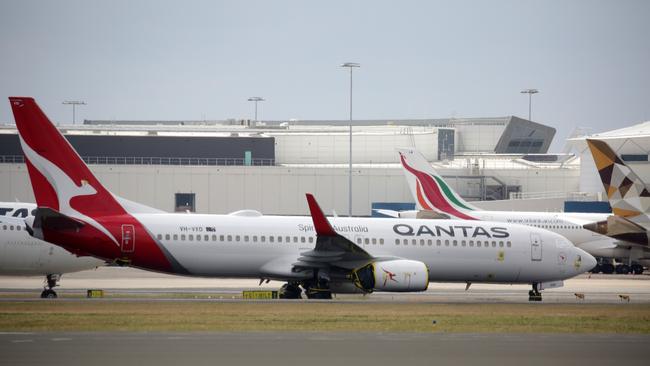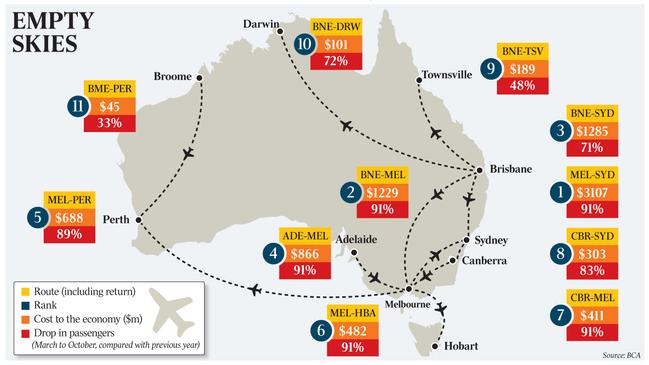Aviation shutdown costing $319m a day
The BCA uses research showing the economy losing $319m a day from grounded flights to urge national cabinet to open borders.

The nation’s peak big business group has seized on new research showing Australia’s economy is losing $319m a day as a result of grounded flights to urge national cabinet to open state borders and announce a plan for unrestricted local travel by Christmas.
New analysis from EY, commissioned by the Business Council of Australia, shows the shutdown of the aviation industry during COVID has cost the economy $78bn and passenger numbers on our busiest routes have plummeted by up to 91 per cent.
State borders closures alone were costing $69m a day, or $2.1bn per month.
BCA chief executive Jennifer Westacott hit out at border restrictions and said that national cabinet — which meets on Friday for the first time in five weeks — must announce a plan for domestic travel before December.
Getting Australians travelling by Christmas would deliver an additional $3.3bn for the economy and be a “social and economic gift”, she said.
“We are not asking for a free-for-all — we need a highly targeted, careful and gradual reopening of the economy based on health advice, with robust nationally consistent systems in place for departures and arrivals, quarantining, local containment, and digital tracking and tracing,” Ms Westacott said.
Between March and October there were 91 per cent fewer passengers on Melbourne to Sydney, Brisbane to Melbourne, Adelaide to Melbourne and Canberra to Melbourne flights compared to the same time last year.
Passenger numbers dropped by 89 per cent on Melbourne to Perth and 83 per cent on Canberra to Sydney trips.
Ms Westacott wanted the Morrison government to map out how the country could gradually and safely remove the international border ban.

International aviation generated about $100bn a year in export revenue and supported 515,000 jobs. While she said priority should be given to returning Australians, international students and people on skilled visas to support business growth, she said travel corridors should be established with countries like Japan, Singapore, China and Korea when it was safe to do so.
So-called “travel bubbles” with those countries and New Zealand, which has begun flights to Australia that do not require passengers to go into hotel quarantine once they disembark, would generate $20.5bn over 12 months.
“Other countries are opening up their international aviation in a COVID-safe way,” Ms Westacott said. “We can’t afford to be left behind and miss out on opportunities to establish safe travel corridors with other low-risk countries who have also managed the virus well.
“This is not a temporary problem for Australia. If we fail to begin carefully reopening, we will lose our international competitiveness and ability to attract investment and talent.’’
The aviation sector was one of the first industries to effectively be closed by COVID-19 and is expected to be one of the last to fully reopen, with Qantas and Virgin laying off about 11,500 employees.
The EY report noted internal border controls had rarely been adopted in other countries as part of their COVID-19 responses.
Australia “remains well behind other countries in getting domestic aviation flying”, it said.
While the percentage of travellers this year on Australian flights was 21 per cent of seat numbers in 2019, the report found there were actually more passengers in Korea (110 per cent of 2019 numbers), China (107 per cent) and Taiwan (106 per cent) in 2020.
While other countries like Japan, New Zealand and the United States also experienced declines in passengers with seat bookings coming at 75 per cent, 68 per cent and 52 per cent respectively on 2019 levels, they all out performed Australia.
“The lack of certainty continues to deter business confidence, including in broader aviation, tourism and regional Australia,” the EY report states.
“Australians are being held back from making plans to holiday and visit friends and relatives interstate. Economic recovery will be stronger and faster if the timing and priorities for removing travel restrictions are clear.
“Transparent protocols for the resumption of domestic air routes should be developed and announced before December.”



